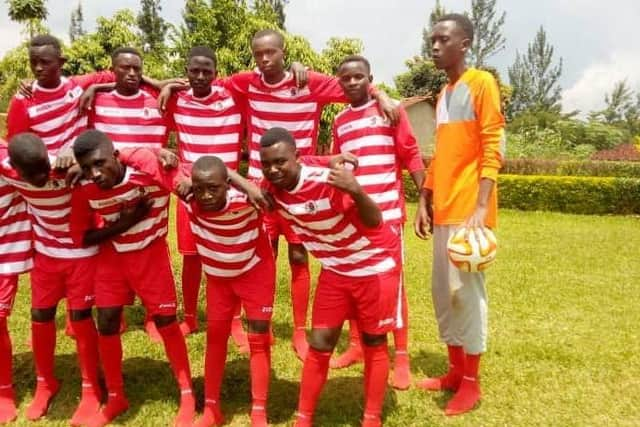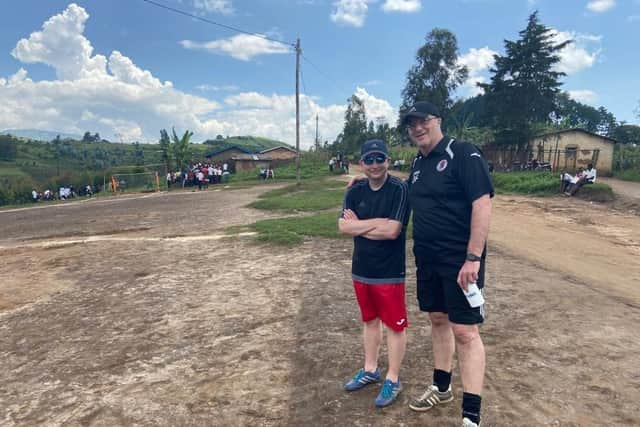Lothian football clubs learn lessons in unity from Rwandan communities


It was a horror which shocked the world and forever scarred a nation.
A quarter of a century later the communities of Rwanda are still working to repair the damage caused by the horrific genocide of 1994.
Advertisement
Hide AdAdvertisement
Hide AdAnd now coaches from six Lothian football clubs have vowed to learn from these communities after a ten-day trip to bring lessons from the Rwandans’ work towards reconciliation home to Scotland.


“Because of the atrocity there in Rwanda people had to really pull together,” said Alan “Chalky” White, Head of Community at Hearts, which organised the trip.
“We wanted to bring something back from that, and for that inspiration and motivation to rub off on the Scottish clubs and to help us do better in what we’re already trying to do in the community,” he added.
Mr White, who had made the trip to Rwanda before in 2016 with Tranent FC, wants to see a legacy of connections between community football clubs in the Lothians and in Rwanda.
Advertisement
Hide AdAdvertisement
Hide Ad“Being a professional club we wanted to align with community clubs and organise another trip, and all the clubs which came along do things other than football in their community,” he said.


“We want this to be a legacy, and to encourage more clubs to do the same kind of project.”
Coaches from Scottish FA Legacy clubs Bonnyrigg, Murieston, Penicuik, Spartans and Tranent joined the ten-day trip.
The group left for capital Kigali on January 31, and spent ten days travelling the country and visiting football clubs, from children training in swamps to the Rwanda Premier League.
Advertisement
Hide AdAdvertisement
Hide AdThey brought donations of football kits and other clothes and toiletries with them, but the main purpose of the trip was to educate the Scottish coaches about the history and culture of Rwanda, and especially about the Rwandan genocide.
In just 100 days in 1994 an estimated 800,000 people were killed in Rwanda by ethnic Hutu extremists.
They were targeting Tutsis, the ethnic minority which had long dominated the country as well as political opponents of any ethnicity.
A quarter of a century later Rwandans are still working to rebuild communities hit hardest by the massacre, and the hatred and division it left behind.
Advertisement
Hide AdAdvertisement
Hide AdMark Fleming from Sports Chaplaincy, who has been a regular visitor to Rwanda for the last 13 years, led the 18-strong group, taking them around some of the genocide memorial sites in the capital, an experience that “really impacted them”.
“When you hear these stories they’re so difficult to compute. I was really taken aback when I went for the first time in 2016,” said Mr White.
“The people there said they wanted the clubs to come back in the future, to learn about the history of Rwanda and see how these communities are rebuilding themselves,” said David Hamilton of Bonnyrigg Rose.
“We want to build a legacy and go on more trips. We’re thinking of fundraising throughout the year and then going out again. We’ve all gained different life experiences and an understanding of the world from going on the trip, and those life lessons can be brought into the community at home.”
Advertisement
Hide AdAdvertisement
Hide AdThe trip also fostered links between the Scottish clubs, many of whose coaches had not met before.
Each club did their own fundraising, and collected donations to bring with them as well.
Bonnyrigg Rose received so many donations of clothes and other items that the coaches couldn’t fit all of them in their luggage space, despite an extra allowance for the whole group of 150kg from Turkish Airlines in support of the trip.
Instead Bonnyrigg will distribute the donations to local schools, also taking the opportunity to share stories and lessons learned.
Advertisement
Hide AdAdvertisement
Hide AdThe club will now choose a number of projects and charities in Rwanda to raise money for throughout the year.
“Now we’re back we’ll get together to decide which projects to support, but there are so many I don’t know how we’re going to pick. We want to choose the right project and make sure the money is going to the right place,” said Mr Hamilton.
Participants in the trip emphasised the links fostered not only with Rwandan clubs, but also between the Scottish coaches.
“We wanted to take these community clubs across, but what we’ve ended up creating is a community of community clubs as it were,” said Mr White.
Advertisement
Hide AdAdvertisement
Hide Ad"The people who went on the trip really bonded, even though they hadn’t met before. Everyone had a common interest in football and in doing the best they could for the community.”
Mr White also brought his 14-year-old son Dylan on the trip.
The youngest in the group, Mr White hoped he would be “inspired” by the experience.
“He said he was only going to shut his dad up, but when he got there he saw a different culture, and I think he did really well,” said Mr White.
Advertisement
Hide AdAdvertisement
Hide Ad“I think we achieved so much more than what we planned to. As soon as we landed everyone got involved with the kids, the coaches and the community, and with learning about the genocide.”
The trip was a “phenomenal” success, said Mr Fleming, who would like to see the trips become a regular event.
“Every single person in the group has said they want to go back, they’ve fallen in love with the place,” he said.
“Football is a great healer, it’s a great way of uniting people.
“You think about some of the petty rivalries we have around football here in Scotland and wonder what it’s all for.”